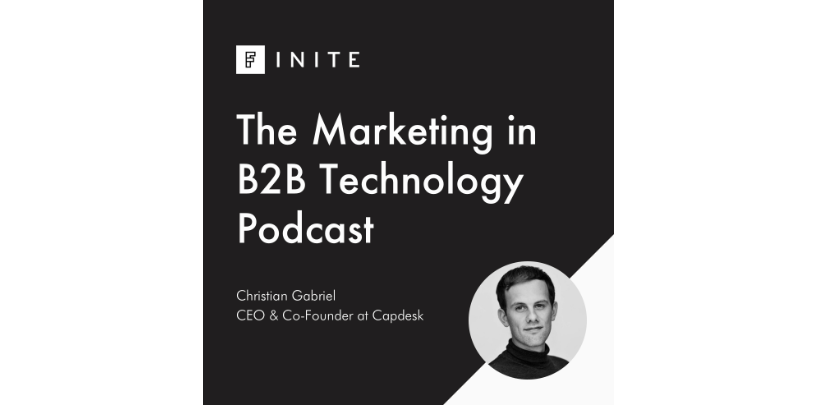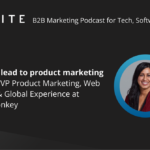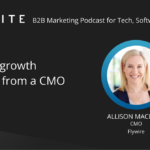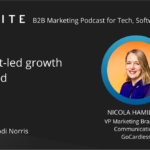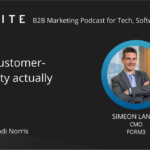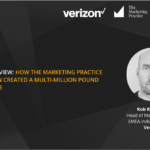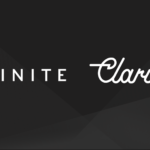Christian Gabriel is CEO & Co-Founder of Capdesk, a platform companies can use to manage their cap table, employee option and warrants.
FINITE podcast host Alex Price sat down with Christian for our first ever episode with a Founder, to pick Christian’s brain on his perspective on marketing after raising a Series A, given this is an interesting inflexion point in a scale up company’s growth. We also hear all about his experiences of previously building out a marketing function along with his future plans looking forward.
This episode covers:
- How and why Christian founded Capdesk
- Capdesk’s marketing strategy leading to it’s Series A investment
- How Capdesk found market fit
- Hiring for a sales role vs hiring for a marketing role
- Building a marketing function in a startup
- Mediating conflict between marketing and sales
- Growing marketing function after a Series A investment
- How to measure the success of marketing
Listen to the full podcast here:
And once you’re done listening, find more of our B2B marketing podcasts here!
Full transcript
Alex (00:07):
Hello everybody and welcome back to another episode of the FINITE podcast. Today, I’m sitting down with Christian Gabriel. Christian’s a CEO and co founder of a business called Capdesk. This is the first time we’ve had a non-marketer on the podcast. And the reason for reaching out to invite Christian on to an episode was that they’ve recently raised a Series A and so I wanted to explore how, from a founder’s perspective, he’s looking at the marketing function post Series A. We typically see that it’s a really interesting inflection point in growth.
Series A often aligns with the transition from going from sales led growth into marketing led growth. And I’m sure Christian is going to have some really interesting insights around how he views the marketing function and its role in Capdesk growth now that they’ve raised their Series A. So I hope you enjoy.
FINITE (00:54):
The FINITE community and podcast are kindly supported by 93x, the digital agency working exclusively with ambitious fast growth B2B technology companies. Visit 93x.agency to find out about how they partner with marketing team and B2B technology companies to drive digital growth.
Alex (01:16):
Hey Christian, thanks for joining me today.
Christian (01:18):
Thanks Alex. Thanks for having me, I’ve looked forward to this all week.
Alex (01:22):
I think this is one of first podcasts we’ve done from the perspective of a founder, looking at the marketing function, everything else, CMO, VP marketing and other roles. So I’m looking forward to hearing about all the exciting stuff you’ve got going on at Capdesk and the recent Series A, and your future plans, but why don’t we start as we always do with a quick introduction, you can tell us a little bit about how you ended up as founder of Capdesk and your experience today.
About Christian and Capdesk
Christian (01:48):
Yeah, definitely. Thanks a lot. I hope I’m not going to scare anybody away, coming from my founder point of view to marketing, but yeah. Essentially Capdesk are an equity management platform and while that sounds quite nerdy, I don’t have a finance background whatsoever really. And that’s perhaps why I founded Capdesk because I studied computer science to some degree and did a bit of graphic design.
And then I was hired to work for an investment platform and everybody in that investment platform had a finance background and it was a little bit, you know, like the emperor’s new clothes where the little kid says he’s got no clothes on. I just said, where the hell is the equity you’re selling?
And they’re like, oh no, you don’t get it. You know, it’s something you learn in business school, they’re in spreadsheets and then PDFs. And I was like, no, that’s a horrible, horrible way to treat 90% of their economy, in spreadsheets.
So I just had this idea that I would take unlisted shares or equity and put it on the internet. So whenever you’re issued shares, and whenever you invest it both as an employee, if you have options or if you are a shareholder of the company, then you can actually lock it into a portal and check the price and how it’s going.
So I thought that was quite a simple idea, but nobody had really done it before. So five years ago we set that up and now we work with about 1000 companies, all like Series A plus and about a hundred thousand employees using our platform.
Alex (03:22):
Cool. Exciting. I’m sorry, I know you’ve been on quite the journey. You recently, and the reason I got in touch with you raised Series A, which is exciting for yourselves. I guess the angle of which we’re looking to this episode is our observation generally as like the Series A is an interesting reflection point for growth. And often that transition period from sales lead to someone’s founder lead growth.
And I know you’ve done some of that yourself, into needing to fill the top of the funnel with more and do more marketing and bring in more leads. So I guess, setting the scene, why don’t you tell us a bit of the background of your approach to sales and marketing so far and how you’re starting to look at potentially how the Series A is kind of shaping the future plans on the marketing front?
Capdesk’s approach to marketing
Christian (04:06):
Yeah, definitely gotten on that. I think the main, the main problem is now we are a B2B SaaS company, so to speak, in a market that hasn’t necessarily existed before. And from the very beginning, you as a founder are in a catch 22. In order to get clients, you need a decent experience and amount of marketing and sales and that requires money. But in order to get money, you need to execute marketing and sales.
So I think what we did from the very beginning is this kind of somebody told me about the analogy of making a startup. It’s a little bit like throwing yourself off a cliff and building a parachute on the way down. And that’s effectively what we did for the market. I had the idea for the platform, and then I just started going around to people asking them, you know, what you think about Capdesk, what is it and so forth?
And I did all sorts of stupid ideas like the adventures of Penny. That was my animation movie about, it was called out called as patronising on Twitter for, it was just not the intention. My intention was just to educate people about cap tables. I did blogs. I just did everything. And it was sort of just left and right, and everything.
But I think the first two years, what was really important as a founder, or if you’re early stage marketing, I think it’s focusing on wins, which you control. So you don’t have a marketing funnel. Now, you don’t know how it’s going to convert down the funnel. You just simply don’t know. You don’t even know you’ve got a product. You don’t know the market likes it.
So what I did is I think I went out and I just made sure that I could control the metrics I was reporting to the board. So I could not control the amount of companies using Capdesk because it required too much. But what I could do is control the users because it could go out to them. The companies that had as many employees and as many shareholders as possible, and I could say, please use my product. And then when they use my product, they would invite all their shareholders.
And then I’ll go to my board and say, hey, you know, 500 shareholders just joined Capdesk, isn’t that amazing? It’s really working. And then we focused on that metric because that was one metric I could control. I would make sure to get at least one of these a month. And then I focused all my efforts in this niche market, which was crowd funding companies with a lot of shareholders and surely enough, you know, that was enough.
We launched January 16 and I know it was for five companies been helping before we got 2000 channels using our platform. And we were able to raise our first round because of like, yeah, you’ve proved us right. And then I moved to the UK, continued doing it in the UK.
And after a year we had about 10,000 journalists using us and a big VC fund saying like you’re doing quite well, getting all these sophisticated users on the platform. And then I said, yes it was intention all along. Now we need to get all those shareholders to invite the other companies, to get the network effects. Of course, that was bullshit though, because it’s not like they’re just going to do that tomorrow. It requires a lot of product development, but it was enough for me to just get that money to the next stage.
So then I had my first two seed rounds and we had to do something a little bit more because now we need to look at the quantity of companies, not just users. The most important metric. What I did there is I hired a Junior Marketer and I hired a Head of Sales to begin with. And our very first way of working was, oh my God, it was terrible.
So me and my Co Founder and Head of sales would all sell together, which is just cold call, cold call and send out emails. If we closed the client, we would also do the support and on boarding of the clients ourselves. And in order to support ourself, we would then also each one of us do some marketing. So it’s basically free for all.
What happened is that our Head of Sales at that time, didn’t do that well. And I outperformed the two others being CEO. So it meant that more pressure was under my sales. And then I told my Head of Sales, maybe you should actually move over to marketing. So the first thing he did is he went over and he bought a very expensive CRM HubSpot. And he set that up and said at the end, I’m going to do some marketing and what that was about.
And, what happened then? Then I let go of that guy because he wasn’t really good at creative marketing. And then I hired a junior, I thought, brilliant marketer. So I’m going to hire a junior marketeer, focusing on content. And then yeah, from that point on, I literally every week just went through and I said, optimise.
If you’ve heard about OKRs, I said, optimise the amount of MQLs by 30% each quarter, that’s your target. And let’s go through every week, if you want ideas from me and then execute those ideas into the books. And I did that and then I just got into HubSpot. So I literally just became so engrossed into HubSpot, into marketing automation optimisation. So I wanted to build a process around her and that’s kind of the first chapter of Capdesk, then the next three chapters I can tell you about.
Alex (09:22):
Yeah. So we’re going to get to that, but I guess it’s interesting, and worth touching on, you’ve told the story of how you’ve had to paint a picture and tell the story for your investors to start climbing that ladder.
How does a VC backed business kind of influence your approach to marketing and is there an additional pressure that comes from that type of funding journey? Do they ask about your marketing efforts? Like how do you communicate around what you’re doing on the marketing front to them?
Christian (09:49):
Yeah, the tricky thing about being a venture backed company is that once you play the game it never stops and the game is that you need to increase the share price within a given amount of time. And that given amount of time is typically, so you typically raise about 18 months and that gives you an 18 month, that is best case, but you don’t always raise for 18 months, maybe in the beginning we raised for like a year and then they take half a year to fundraise.
So then you’ve got between six, six to 10 months, or 11 months to show results and keep in mind when you raise the money, you don’t have the talent. So that leaves you with hiring a team in two months, getting the team up to work, like training them, training the team up within two months and then getting to execute really well while you continuously improve the metrics while you recruit them.
And I think that puts the pressure on these longterm and short term models where, somebody might come in and say, I want to prioritise all our marketing for a SEO plan, which is fine. It’s great. But if you need to improve metrics after your next shareholder meeting, and you’re telling them about your doing longterm SEO plan, that’s not going to work.
So you kind of have to play a very delicate diplomatic game where you tell your shareholders great stuff that’s happening. And it’s a little bit smokes and mirrors because in reality, you’re working on a longterm thing.
Alex (11:15):
That makes sense. And so you’ve told the story of having that first Head of Sales come in and working alongside yourself and Co-Founder, where would you say, where in that journey you were at in terms of product market fit broadly?
And obviously to bring in a Head of Sales, you must have a certain degree of confidence that you were heading in the right direction, but at what point did you feel like you had Capdesk in a state that it was kind of ready to go to market?
Finding market fit
Christian (11:38)
Yeah, I think it’s that thing like throughout everything I do, and I spoke to my sister yesterday because she’s looking for a job and I said, never join a company where the CEO hasn’t sold himself. Because if you throw a marketing person or a sales person after the problem, to fix it, then it’s not there.
So I always felt like a little bad that I had to go out and do the hard bits and then I’ll prove, hey, it can be sold. I did it. Now you do it better than me. Right? And I didn’t necessarily know that early on. So when I had my Head of Sales, it was probably a little bit prematurely. Perhaps I should have focused on the metrics and sales cycle.
You know, all those things I’d never worked in, you know, in enterprise sales, or B2B sales really before and not across the whole funnel. So with very few resources, you want to get the most our of your 16 team. So it means that I was literally Googling every night. I learned so much about it, but in reality, I should probably have seen what I could have done better.
I should probably have done it myself rather than involve the rest of the team. And then I should have focused on once I get the average sales cycle down to 40 days, and I also get my reply rate on emails up to 6%. And, once I get the average account up to this, then I’ll hire a Head of Sales and say, do it better.
And only then, and then I told my board and then going to not spend the money, I’m just gonna have it in my bank month till that’s done. Because you just, as I told you, before you just start hiring. And I think that’s the situation now, definitely to the marketers out there and salespeople, they’ll be wary about joining a company where they haven’t done that because it maybe was my sales look that was the problem. It was, it was us. Right? So um yeah.
Alex (13:26):
The passionate founder can carry a lot of weight in a sales environment where you know the product inside out, you’ve been involved in everything. You’ve obviously got a technical background and you know how it works. Like you can pull everything together and you’ve got a big advantage of being able to walk into the room and have all of those things up your sleeve.
If a Head of Sales is good at sales but not necessarily like an expert in all domains of the products and how it can help people so I guess there’s kind of pros and cons. I mean, it sounds like time restraints and the pressure building up in yourself. And the main trick is to think about bringing in or delegating bits of sales and marketing, is that a fair summary?
Christian (14:07):
Yeah. I think so time is the main time turn execution. I think time turn execution and agility. That’s probably four things. You mean you need to be super agile. So I’ll tell you about the next chapter of the journey with the marketing, because then I learned the hard way what not to do in another way, come to that.
But, I think if you hire, let’s just say you hire super senior guy, like super, super, super senior sales guy who comes in with his methodology. He comes in with his way of seeing the funnel, you know, the playbook and so forth. And you don’t have the right pricing nailed yet. You don’t have product market fit nailed yet. You don’t have your competitive landscape nailed yet. Then that is all just in the bin. It’s, it’s worth nothing. So you can also over hire at the same time.
Yeah. So you want somebody that’s agile in the way he works, both in sales and marketing, so super agile. And you want somebody that can execute weird tasks because you know the thing about MQLs is that they’re so important, but they’re everything right? Like MQLs is also going to an event or it’s going down to asking your uncle if he knows anybody.
And sometimes I feel like we hide ourselves behind technology instead of just seeing it for what it is. It’s a person that’s interested. And I think if you start with the very bottom, if you really know your funnel and you’re like, we need to get people interested, HubSpot doesn’t work, this doesn’t work, but I need to get five MQLs this week.
Then you should have somebody that has an entrepreneurial mindset in the marketing department who says I’m literally going to go to events all week and I’m going to be out until I’ve got my five MQLS. And that’s my punishment for not executing well enough in the technology side. Like if you have that mindset right, then I think you’re good. But if you don’t have that mindset, then you very quickly become unqualified to work in a startup at the early stages.
Alex (16:01):
Yeah. Yeah. It’s that diversity and being able to juggle so much that I think is clear. We’ll talk a little bit more about this as we go for like a more rounded generalist marketer or more specialist marketers and obviously as such a diverse landscape I don’t think there’s any one right answer.
But before we get onto the next chapter, I guess it’s worth touching on Head of Sales was the first role, but ended up doing some marketing too, and you guys were doing some marketing alongside the Head of Sales role, but I mean broadly and maybe looking back as well with some reflection, Head of Sales versus Head of Marketing first.
I guess we can typically see that Head of Sales or the sales function has the opportunity to test selling in a smaller environment and more one to one environment. And maybe there’s more of an advantage when you’re finding product market fit. Once you’ve found it, then you can scale up marketing. I think a lot of businesses we see probably start with founder led sales and then someone joining to help with growth and sales before they get to marketing. But what’s your perspective on that?
Hiring a sales person
Christian (16:55):
That’s such a good question. And I keep on changing my mind about it. I think in all honesty, I have to say a good marketer is really hard to find. I think in general, when you hire a marketing person, what I’ve learned from marketing is that there’s so many profiles and there’s more, I would even say there’s more profiles out there in marketing than there is in sales.
A sales guy is used to, like a sales guy doesn’t have to be technical savvy. He can have a good drive, be good at negotiating and work hard, you know, and then he can be a brilliant sales guy. But a marketer needs to have so many other needs to keep them up to date with so many things.
And therefore the risk, I would say, if you want to play it safe in terms of hiring and recruiting and you’re stuck and I started out in Denmark, right? If you’re starting in Denmark, let’s just say the talent pool was not available and you can’t find somebody. Then the risk of hiring a bad sales guy is less than the risk of hiring a good marketing guy. However, if I were to go back in Capdesk history, I would say, I’ll turn it around and say, even though you don’t have product market fit, or even though you don’t have the right tech or the right salespeople, a marketing person, that’s still provided MQLs you can use five years up.
So where a sales guy, he doesn’t create any value at all. Especially if it’s one of those sales guy that’s bottom of the funnel with focusing on closing and getting that done. He doesn’t create any value at all. Whereas the markets will actually help with product market fit. They would have internal brand material and more importantly, and that’s what I should have done long ago.
When, before we launched, we had no idea what an MQL was. We had no idea. We didn’t have any database of collected stuff. And it was only two years later when I found out, I literally took all my emails and I used the weekend, and just went off all my emails for the first two years just to tag people correctly without that fault. So I think it’s high risk, high reward marketers, and it’s a low risk, low reward sales.
Alex (18:51):
I think what’s interesting for you guys is you obviously have a very kind of, you’re new in the market and you’ve almost created your own market, I guess, in this space. And so you’ve got a very educational buyer journey that you need to take people on, point out to them that your product can help when they don’t even realise they’ve necessarily got a problem to some extent.
And so I guess that kind of product often needs more marketing to educate people and drive it forward at the earlier stages, which is interesting. So maybe that’s the differentiation is that when it’s such a newer and more educational journey overall, then marketing maybe needs to be involved earlier on.
Christian (19:25):
Yeah. And then again, we had, supposedly like Monzo, we had no clue what we were doing. I mean, we didn’t know. So I remember I had a carpenter signing up my platform and I was, I was literally thinking, yeah, of course you can use that product, he’s got equity.
And I’ve had like, I wouldn’t have any way of sales qualifying my leads. I would genuinely get excited with every single one that came from our site. And I would spend founder time speaking to every single guy. And I guess you have to do that. When you come invent your new market, because you need to make sure there’s market fit. Who is going to use us?
And you become more and more concrete and more like, no, I’m not going to speak to you, just go somewhere else cause you’re not gonna use us. But it ticks so that’s also the risk of the marketer is that the markets is great going out and looking. You know, the marketer would come to you and say, describe your persona. And I’d be like equity, right? No, but who is your persona? I have no clue. So I guess you have to take some beats before as well.
Alex (20:01):
Yeah. So let’s move on to the next chapter as you call it. You’d been through the process beginning with the build out of a marketing function previously. Tell us about how that played out.
Building out a marketing function
Christian (20:41):
Yeah. So we hired a content writer and my basic thing was it was a graduate position, right? Write a lot of content and at least we can get the content out we can always reproduce it. And I had this amazing plan. I did this long, long, long funnel where, how marketing plans, services, sales, and lead generation will all go together with workflows and HubSpot and how they automatically get tagged.
I created over the course of a month, more than a hundred workflows, mostly to deal with data cleaning and the data attribution. And I had so big and I put up dashboards to every single department on what they wanted to realise, but I never experienced this. And it was just way, way, way over engineered. So it meant that, you know, it created more questions than it answered really. And it’s all my HubSpot training and all my HubSpot learnings for the workflows I had for the first time ever an idea of where I wanted to go.
But getting from my sketches to there and implementing it was just two different things. So what happened is I hired a new head of sales. He started, um, couple months, six months later, he came in and that head of sales is very, very, he’s a closer. Like he’s not the guy who sends emails, cold emails or cold calls. He’s a closer you get him and he just closes the accounts and he gets a lot of revenue out of it. And he absolutely came in and he smashed it. But he also basically said, I’m not going to touch lead generation, get somebody else to do that.
And then it meant, you know, I had me, I had my marketer and I had a very expensive Head of Sales who are good at closing. So what did I do at that step. So here into the chapter of lead generation. Because now I had somebody to close leads, but I didn’t have any continuous leads except for the content writer.
So I reached out to a guy who had just graduated and I thought I would recruit him to be an SDR. And I said, hey, you get XYZ percent of whatever leads you get my sales guy because he needs things to close. And we very quickly figured out that he actually took over and started doing all emails. So he found out that I don’t need to call them I can just send emails.
And then all of a sudden you created this monster department, which just sent emails. And whenever an email said, yes, I would like to know more, this SDR would then send out a meeting link and book a meeting, and then he’ll get commission based per meeting. And then my Head of Sales would do the meetings and close deals.
And what happened with that dynamic is that that was the first tension I felt with two opposing forces and a sales guy who was giving me more meetings. The reason why we ended up needing sales is because I’m not getting enough meetings. And our part time SDR, who just graduated through emails saying, you know, I don’t know, I can’t send anymore emails. He has to help me.
And then we agreed and I had a content writer who I told you to do anything you can do, press releases, do everything, just get me some leads. And we didn’t really have a clue. And then we decided to hire an CMO. And we decided that now we had a closer, so I wouldn’t be burning off leads.
And we had a pretty good, you know, whenever we had an SQL, we had a pretty good conversion. So that’s why I actually went out to raise a bridge round in order to hire my senior CMO. And she came in and she did amazing. She had a lot of tools, but she was what I call it piece time CMO. Somebody that comes in to a department where, you know, you’ve got your designer, you’ve got your CRM manager, you’ve got your content writing team. You’ve got your PR team. And then you sit in the middle and you make sure to execute across a lot of channels.
And it was the most expensive hire we’ve ever done in Capdesk. And then she came in and I think that’s the hard thing about being a peacetime CMO coming into a startup. We had eight month, seven month before I had to go out and fundraise. She had seven months in order to prove that her very high salary was worth it. Which meant a lot of pressure was put on my technical cofounders in terms of data and so forth. And it meant that we did some quick hires.
So she all of a sudden built out a marketing team, which became the biggest team in Capdesk. So we had a designer, we had a content writer, our SDR was hired to be head of lead gen. And then we had one sales guy. So all of a sudden you have an organisation that’s way too big and executing quite passively because you just set up channels, you don’t measure channels as such, you set up channels.
And then you expect if you set up 15 different channels two of them would pay off and then we would double down, but we don’t have time for that. So you’ve got this peace time CMO that comes in and just says I’m going to set up my repertoire of all my nice channels. And at the same time you’ve got one sales guy. So the dynamic there is a little bit funny, right?
Because what’s the leverage you have, there should be more sales guys or there should be less marketers and they should be working together. And what happened there, mainly because all of a sudden I had made two senior hires and I just hired really fast is that they never got a chance to make a joint strategy.
And they were both to some extent, peacetime, the Head of Sales didn’t want to get their hands dirty with too many outbound. He did, but he didn’t like it. And you had a peacetime CMO too. And my job was then to convert the CMO to a wartime CMO and convert my sales guy to a wartime sales guy, because I didn’t want to do all the bits in between.
And then it ended up actually that we had to let go of our CMO because there’s so many conflicts between the sales guy. I think it’s just that they got off on the wrong start, but it just meant that they couldn’t work together because they weren’t aligned and I became the wartime guy and they became the peacetime guys. Whereas I should have actually been the peacetime CEO who came in and was super happy and a little bit chill and like, yeah, I trust the channels, et cetera, more. And they should be the wartime guys, right? Trying to get things to work.
And I think it’s just such a good analogy because I think all marketers know exactly where they are. And are they the ones that get super excited about fixing organisation with a lot of stakeholders and getting in and just making it work? Or are they somebody who was really, you know, can make the perfect even more perfect. Yeah.
Then we had a new stage of our chapter now where I said the main thing I need to hire for now, we didn’t have a marketer. We had a Designer and a Head of Demand Gen. And the main thing you need to hire for now is actually I need to hire somebody, a commercial officer. I need to hire somebody that knows the stuff, I can higher my expectations because then he can be kind of the, you know, the wartime guy who can enforce that into the recruitment. Because I think it’s fair.
I’ve been a little bit bad to my lack of my recruitment of my Head of Sales and my Head of Marketing, because, you know, I wasn’t transparent enough. And so we hired a Chief Commercial Officer who came in now and we’re now hiring a new CMO, Head of Growth as they call it. And what happened when we did that, when we let go of our marketing, our sales guy became a war time sales guy. So yeah, it’s always dynamics.
Alex (28:11):
Looking ahead, you’ve reached Series A recently. Are we still, I mean, at what point did you think you might go from wartime to peace time? I assume it’s still all the time from your perspective January in terms of like goals and objectives and not as much chaos as a year of two ago.
Are you still viewing this as you need people that are willing to get our hands dirty and jump around in a lot of stuff? Or do you feel like there’s a bit more structure and stability for people to own certain things and not have to be as agile across all kind of different parts of the business?
Christian (28:43):
Yeah, I think it’s good mix of both, to be honest. I think now, so before the round two ratings for like 1 million pound 500K, 200K, 300K served us very little wiggle room with our Series A round now, and we’re closer to more money soon as well. It’s going to give us a two year runway, which means that we can plan out metrics that are a little bit longer, but also we can recruit more patiently.
And I think that’s the key thing, not rushing recruitments and not rushing the training and so forth as I did with both my previous Head of Marketing and Head of Sales where I just, I could have done much better there in terms of training. But yeah, I also think that, you know, a startup, even a Series A startup is no place for peace time. And can you coach, which I’m sure I could, I’m sure I could make my CMO more wartime, but then in order to be wartime, you need to understand all the pieces of the business because you need to operate with quite a lot of autonomy.
So in order to cater for, in order to create a wartime employee, you need to have a super, super, super tight training program. You need to understand the product right away so that you can make autonomous decisions. Or else you can’t really be as agile and you need to just sit and wait for approval.
Alex (30:04):
I think that’s a really good point. I think in every role, right? Smooth on boarding as I know from my own business how important that is. And I think like the first three weeks shaped the next three years potentially in so important to get right. Even more so with the kind of marketing and sales coming together, are there things you’ve thought about around sales and marketing alignment specifically?
I know it’s like within the marketing world, it’s a big area of discussion and debate. And I think that natural tension that exists between marketing and sales will always exist to some extent. And it’s something you could argue is a healthy thing, but based on maybe not having the kind of level of alignment you needed in the past, how do you think you’ll approach that aside from kind of clear on boarding and the things that you think you can do to, to help bring that alignment together? Or is it just a case of finding two people that actually just click and work well together?
Aligning marketing and sales
Christian (30:54):
I think there’s natural conflict between marketing and sales, but what struck me about what I experienced myself is it becomes a little bit more because it’s so well known and because all salespeople and marketing people know, they say, I don’t see that as a problem. I’ve got my own way of dealing with it. Do you know what I mean?
So it’s almost become no, I’m such a good marketer. I’m such a good sales guy. So I know how, I think it should be to join together. It’s so easy to say, but in reality, you know, you never hear that in reality. There is just conflicts in between them and it can never be solved. It’s just communication. It’s just acknowledging the conflicts. We have conflicts with marketing a product, product and client services, client services and sales.
There’s a conflict between all departments, which we speak and are quite honest about, but for some reason the sales and marketing one is just, no, no, no. We have seen all these things and sat there and we follow all these podcasts and we know, no there’s a conflict, sit down and outline some plain rules and how you’re going to get over them. So I just think it’s a natural part, tell me how you’re gonna communicate around the conflicts going forward.
Alex (32:02):
Yeah. Yeah. I’ve seen some businesses put together like a sales and marketing agreement almost. Like literally a SLA that says like, this is what we’re promising each other, and this is what we’re going to deliver to each other because there’s a number of ways of approaching it. But I think I like that as a tip in terms of just communicate just sit opposite each other and have a conversation is often what it just comes down to.
But I’m interested in that you’re bringing in a CMO now, are there particular activities, channels, things that you haven’t done yet on the marketing front of that you think now post Series A with some more money to spend, but also the CMO role coming in that you’re looking to explore?
Marketing after Series A investment
Christian (32:38):
I think what worked really well, just before that. So when we let go of our CMO, which we’re all really sad about because obviously we like the person and so forth, it just didn’t work out and they would love to be there. I said to my staff double down on the channels that worked before and they doubled down on it and it really worked.
We really, you know, kicked ass on a marketing point of view. And what I found out is that I would like to hire somebody that’s not necessarily a marketer, but more Head of Growth because I want to T-shaped one. I want a T-shaped person that can work really closely with the product client service team and experiment with generals.
And this experimentation thing is, now we spoke about how we speak so much about something that it just becomes nothing. A little bit like the conflict between them. It speaks so much about something that you don’t do anything about it, which could be the conflicts about sales and marketing. You speak so much about it but you don’t do anything about it. Same thing with experimentation.
I find it so hard to find the marketers that are actually really including experimentation into how they work. And I also find it really hard to find somebody that can prioritise because you are T-shaped, you sit with your product, the one in the company, and they use the most products that has the most conflicts with most departments. And you have so many tools and you have so many ideas.
How do you prioritise those ideas? And at the same time, make continuous experimentation? And also deliver longterm projects? I find that really hard. So I’ve actually, what I’m going for in this role is somebody that can come in and… well the approach I would like is please export HubSpot into, I don’t know what that file is called a, CSV file. Then I’ll work with the data and I’ll see what we can improve. Like that’s what I would do. If I had enough time, I’m not good at it.
I would ask HubSpot and just go in and see, based on HubSpot, I can see where all the mistakes are calculated, you can build dashboards and so forth. That’s the approach I’d like to see. I don’t like to see the approach, ‘this is what I did in my earlier company, that’s what I’m going to do here.’ And I think that’s the difference. And then I would like to learn new tools. So I’m going to find 10 ways of solving this, which one should we choose? I haven’t done it before, but I trust I’ve got like a professional arrogance enough to know that if I choose one of them, damn hell, I’m going to execute on it. That’s the approach I would like.
Alex (35:02):
So pretty data driven, pretty experimental in terms of, yeah, that makes sense. And then I guess if this person is relatively kind of T-shaped, do you imagine that they start springing more specialist roles underneath them as a kind of marketing function more broadly grows out?
Christian (35:19):
Yeah, I think it’s about, I mean the best, I just spoke to one of my employees about it as well. So we all see our success typically in terms of compensation, responsibility, and kind of a leadership team you’re managing. Oh, now managing a team 10, last year I was managing one.
I think like that’s how you measure your success to some extent. And I would like to see these new senior staff coming in on a marketing position or a sales position be a little bit like when I was three years ago, an icebreaker. So you come in there and you break the ice and now you know, this is worth a full time position and it’s going to generate me this, put together the case and hire somebody and say, you need to now break through these problems.
And what will come out is hopefully you can reduce our customer acquisition cost by 30%. If you can do that, then I’d like you to go hire that person or even better. If you can do that, you can literally set up your own silo with more responsibility where you report directly into the board about our current condition or 20% plan. Right. So I think, I think that’s how I’d like to see them. I’d like them to have a recruitment based on the metrics.
Alex (36:37):
And that was going to be kind of my last question was around, I guess, measuring the success of the marketing function generally. I know when we talked before, there’s more product led marketers, there’s brand led marketers, there’s measuring everything from cost of acquisitions and MQLs to even the impact on revenue and attribution and B2B is always really difficult, but it sounds like you’ve been through HubSpot in some detail and set up all kinds of different reports and dashboards probably to the point that it was overkill at the time.
But how are you viewing the reporting side of things now? And like in a nutshell, how would you know if the marketing functions being successful?
Measuring the success of marketing
Christian (37:11):
Yeah, it’s a really good question. I mean, there’s so many different ways of looking at it. For me, it’s about I would like to do two things from a marketing point of view, which I think I’ll recommend all B2B companies too. Tier your MQL’s, do a tiering. And so you actually know this is a low tier, mid tier, top tier SQLs and they’re qualified in that way.
A marketing guy can do it, but while it’d be awesome, if you just had a dashboard and you could see latest engagement from top tier leads by tier, right? So you literally could see, I had a top tier lead re-engage by content or clicks. So you start kind of pushing the sales and the way you think about leads into relevance and tiering of MQLs rather than just this funnel, this funnel approach, where it’s just like it happens.
And then it goes through because I can just see there’s so many people who re-engage and you might be like the CFO equivalent, literally just downloaded something yesterday, called him instead of called the 20 leads and just requested a demo and a website that I’ll load here and then start maybe having some predictive forecasting, where you know how much revenue are they going to go for. But I think that’s just my own personal, but yeah I would always say, just show me you can get MQLs.
Alex (38:47):
Awesome. I mean, there’s so much there it’s been such a journey that you’ve been on across the marketing sales stuff. And it’s really interesting to hear from the founder’s perspective, how you viewed that and it’s given me a lot of food for thought and particularly interesting hearing about what you’ve got planned. Who knows maybe one of your future marketing team will listen to this podcast and get in touch. It’s been a pleasure talking to you and the story so far. So thanks for giving up your time.
Christian (39:18):
Of course. Thanks a lot. And if anybody of you out there looking for a job, then make sure to ping Capdesk. Thanks a lot, Alex.
FINITE (39:29):
Thanks for listening. We’re super busy at FINITE building the best community possible for marketers working in the B2B technology sector to connect, share, and learn. Along with our podcast. We host a series of events here in London, so make sure you head to finite.community to subscribe and keep up to date with upcoming events.
